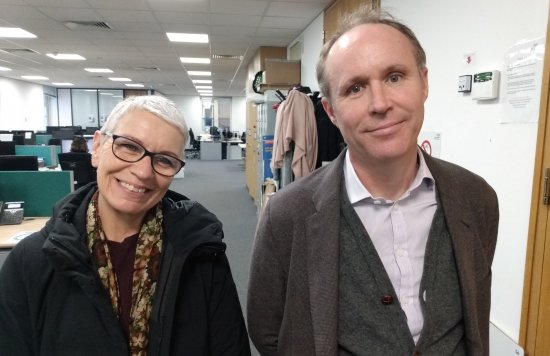To mark World Social Work Day on 15 March 2022 we interviewed Richard Fradgley, Director for Integrated Care and Gill Williams, Director of Social Work at ELFT.
What are your reflections on how ELFT social workers in ELFT responded during the pandemic?
Gill: ELFT social workers were just so impressive. When many organisations that employ social workers told them to stay at home, ELFT social workers were undertaking assessments, reviews, responding to urgent referrals, arranging care packages, and dealing with people in crisis to ensure they had the right support in a fast-changing situation. This was at a time when the risks of coronavirus and what precautions we needed to take were still relatively unknown. They were truly amazing.
Richard: I think they did a stupendous job. They responded to the needs of individuals and to families. As widely reported, there was a significant increase in domestic abuse and child protection issues. Social workers were in the centre of this. They ensured people had food and responded to the consequences of lockdown for many families. They stepped up and stepped in.
The pandemic highlighted what many social workers already knew - the inequalities and disparities many families and individuals face. The theme for Social Work Week 2022 is ‘Co-building a New Eco-Social World: Leaving No One Behind’. Do you think the pandemic will be a turning point in the way we approach or identify people's needs?
Richard: It is vital that we are values-led. It is fundamental to the current job of a social worker and integral to tackling inequalities. I am still a regular social worker. Social justice is a key tenet if we are to counter racism and other forms of prejudice. Having a Director of Social Work has meant these social work values are more prominent and the perspective of social work and social workers is more clearly defined.
Gill: I think it is useful to see the world through the lens of a social worker. I practice as a AMPH (Approved Mental Health Professional) which informs how I see social work. It is a holistic approach, not seeing people as just their symptoms or diagnosis but looking at their relationships with their family, employment and other aspects of their lives.
Do you still feel like a social worker inside? Is there a scenario from your social work past that still stays with you?
Gill. I am a social worker in my approach to most things. I trained in Nottingham and worked with a female in an abusive relationship who had a small child. It took a long time to build a relationship with her and talk through what she wanted for herself and her child. She felt powerless and that she had few options and choices. So we explored that in our conversations although she remained in her situation. I bumped into her some time later and she said those conversations made an enormous difference. You can feel you are not making much difference but you are helping people to make mental adjustments and find themselves, and change their situation when they are ready. That stayed with me.
Richard: I am a social worker through and through. I recall a situation some years ago now when a mental health patient had had an extraordinary long admission on a mental health ward. He was psychotic and depressed and making no progress. In discussion with him, he mentioned that he had a dog in a dog pound. I made contact and got permission to drive him to the pound to see the dog. Seeing his dog had a profound effect on his mental state. It was almost a re-awakening. It didn’t happen overnight and the time was probably right, but eventually, with ECT treatment and other interventions, he was able to get a flat, and set up a life for himself and his dog. That’s when I knew a social work relationship can really make a difference.
What steps are we taking to draw social workers to work in ELFT?
Richard: We want to be regarded as an excellent employer of social workers so we have been thinking- what would that look like? We think social work leadership is key to create the conditions for social workers to really flourish. We are working with the charity Think Ahead and pioneered (first in the country) joint training with a voluntary sector organisation.
Gill: We are introducing a preceptorship programme for newly qualified social workers similar to what they have for newly qualified nurses. This 'Assessed and Supported Year in Employment' (ASYE) is a programme that gives newly qualified social workers extra support during their first year of work. It will enable them to consolidate their learning and offer unique support in a health setting which is different to a local authority setting. In my role, I have been assisted by Katie Lander who is looking to develop continued practice development for all social workers. This will include reflective groups and forums. We are also looking at developing an apprenticeship scheme.
What would you say to someone considering a career in social work?
Richard: Go for it. It’s an exciting time to be coming into social work. There are community mental health training programmes in partnership with the mental health charity Rethink. Social work is identified as an area of growth in the NHS Long Term Plan. There is a move away from case management to core expertise and working in an integrated way with other health and social care workers.
Gill: Social work is a really worthwhile career. We are working with colleges and service users to develop the role to have impact. There is so much to the role. You have to be prepared to challenge inequalities. And you have to call it out when people are not being fairly treated. It is so satisfying to be advocating for people, standing with them and supporting them to get where they want to be.
